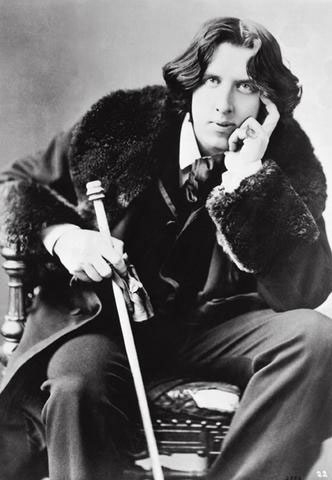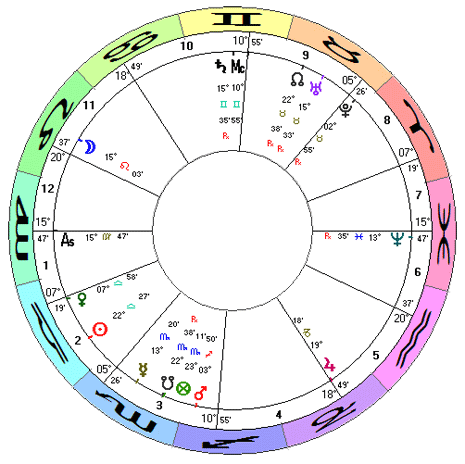From the Almutem of the Chart to the Lord of the Geniture
From the planet that actually rules the nativity, to the planet that ought to.
Paper presented at the 40th International Astrological Conference in Delhi, India, February 19, 2017.
Patrizia Nava
In traditional Western practice, the first step in the analysis of a natal chart consists in trying to assess the humoral composition of the native, which determines his/her temperament (whether sanguine, melancholic, phlegmatic or choleric). The second step, closely connected with the first, is the search for significators, the planets that rule, dominate or characterize the chart. Throughout the centuries different procedures have been used, all of them based on some form of “quantification” of the relative proportion of primary qualities (hot, cold, dry and moist) for the assessment of temperament, or essential and accidental dignities for the selection of the ruling planets.

Oscar Wilde, October 16, 1854, 3.00, Dublin
Almutem
Different procedures, we said, some of which seem to be almost universally accepted, with slight variation, by medieval and Renaissance authors, as part of a common corpus of techniques generally applied by traditional astrologers. An example is the Almutem of the Chart, in the version supported by Abraham Ibn Ezra, who defines it as «planeta super totum circulum potestatem habentis quem sarraceni almutez dicunt» (the planet that has power over the whole chart, which is called Almutez by the Arabs) in his Liber de Nativitatibus, 1154 (Warburg FAH750, p.5).
First of all we have to identify the five vital places in any natal chart: Sun, Moon, Ascendant, Part of Fortune [1] and pre-natal syzygy (full moon or new moon preceding birth). The planet with most essential dignity in those five places will be Almutem, the result of computing 5 points or “strengths” for domicile in the sign, 4 points for exaltation, 3 for diurnal or nocturnal triplicity according to Dorotheus of Sidon (in case of day birth or night birth), 2 points for Egyptian terms or bounds, 1 point for face. To this we add a specific score for accidental dignity, on the basis of the presence in the Houses and their relative fortitude: first house 12 points, second house 6, third house 3, fourth 9, fifth 7, sixth 1, seventh 10, eighth 4, ninth 5, tenth 11, eleventh 8, twelfth 2. Plus 7 points to the lord of the day and 6 points to the lord of the hour.
The planet with the highest score is the Almutem of the Chart, which sums up the meaning of the native’s inherent destiny, the hallmark of our personal approach to life, the planet whose energy permeates us most clearly, immediately available as a mode of expression; our essence or nature, the very fabric of our soul.
The problem is that the Almutem, however dignified in the five vital places, however powerful over Sun, Moon, Ascendant, PoF and Syzygy, could well be without any essential dignity per se, in its actual position in the natal chart. Suppose that the vital places, most of them in Taurus in an imaginary oversimplified example chart, lead to Venus as Almutem of the geniture. Imagine, now, that Venus is in Aries, sign of her detriment. Certainly such an Almutem as lord of that chart will represent the native’s most distinctive qualities, but unfortunately it will hardly be a good counsellor, a valid and reliable resource in challenging situations, because of its essential debility. On the contrary, the very instinctiveness, naturalness and spontaneity with which we tend to resort to that planet, because of our constitution and temperament, could lead to modes of thought and behaviour that are too standardized and repetitive, even compulsive, often unfit for the purpose, the actual situation, or even the needs of our personal evolution or development.
The Lord of the Geniture
If we are looking for what Bernhard Bergbauer calls “the soul’s compass”, a reliable guide, a type of energy that can help us for the best and to do our best, we must rely on a powerful and virtuous planet, the one which has most essential dignity, and is also adequately placed accidentally in the natal chart, in the actual position where it is situated. Essential dignity, supported by an amount of accidental strength, sufficient to make the energy of that planet easily accessible to the native, will guarantee a positive and favourable influence, practically usable in the real world.
That planet is the Lord of the Geniture, the talent that helps us to perform our tasks in the best possible way, the virtue we should aspire to, the advice we should follow, although we seldom listen to it. In fact, while the almutem of the chart usually accounts for readily available qualities we tend to use automatically in response to external stress, the Lord of the Geniture is typically the final goal of an arduous path of personal development. Responding and operating with the Lord of the Geniture is, actually, always a deliberate, adult choice, sometimes difficult and hard, because it is rarely spontaneous. Our “internal king”, as John Frawley calls it, will not ascend the throne by himself. We must crown it and give it the power to rule with an act of conscious will.
Some astrological conditions can foster and assist this inner process. If the Lord of the Geniture is adequately dignified and in some useful relation (aspect, reception, or any kind of familiarity or connection) with the Almutem of the Chart, the transfer of power can occur more easily, though rarely once and for all. Aspects between the two planets, antiscia included, promote cooperation. Major mutual reception makes the transition much easier. The best occurrence of all is, of course, when Almutem and Lord of the Geniture are the one and same planet.
On the contrary, an accidentally strong Almutem in contrast with a Lord of the Geniture confined in the 12th house, would make the handing over very difficult indeed, given the greater accessibility of the former compared to the relative seclusion and ineffectiveness of the latter.
Some charts, moreover, show a depressing scarcity of worthy candidates to the role of Internal King, for lack of sufficiently dignified planets. That’s life! We are not always given a perfect guide to follow. If no planet has essential dignity enough, that does not mean we cannot succeed in life. On the contrary. But we will have to struggle and win, with the little we have.
“The Picture of Oscar Wilde”
An example will clarify the procedure. We are going to examine the nativity of Oscar Wilde, a famous Irish author of the late nineteenth century, a controversial figure of man and artist, born in Dublin on the 16th of October 1854 at 3.00 o’clock, who died on the 30th of November 1900 in Paris, after imprisonment for sexual scandal.

Oscar Wilde
October 16, 1854 NS, 3.00, Dublin
Placidus
Temperamentally melancholic, Wilde was born on the day of the Sun, at the hour of Mars. Calculating all the essential dignities of each planet in the five vital places of the chart, and adding the virtues acquired by each of them by position in the Houses, we obtain the Almutem, Mars, which is also Lord of the planetary hour.
Since his childhood, Oscar had shown manners and behaviour ascribable to his almutem. A well-known anecdote is revealing of his character. Oscar and his little brother had been entrusted to the care of a nurse. During her short absence, the clothes of both children, hung out to dry in front of the fireplace, caught fire. While his brother was crying, obviously shocked and scared, Oscar was clapping his hands enthusiastically. When the nurse was finally able to extinguish the fire, Oscar wept disappointed because the fascinating show had come to an end.
Oscar Wilde was famous, and still is, for his satirical comedies and provocative attitude. Mere verbal aggression, nothing more, which he unleashed against the traditional hypocrisy of the Victorian Age: stinging words, pungent aphorisms, biting remarks, which made him notorious. It is no accident that his Mercury is in Scorpio in the third, its dispositor a peregrine Mars in the sign of Mercury’s exile. And Mars, in turn, is in the domicile, triplicity and terms of Jupiter, while Jupiter is in the place of exaltation and face of Mars, a powerful mutual reception that creates a strong and meaningful bond between the two planets. Jupiter, by the way, rules the seventh house of relationships, and is itself in the fifth house of pleasure, in its fall. That alliance between Mars and Jupiter is not alien to Wilde’s provocative sexual life, utterly unacceptable to the prudish Victorian society.
Let’s identify, now, the Lord of the Geniture. There is no doubt the only plausible candidate, great in essential dignity for domicile and terms, is Venus in Libra. All the other planets are peregrine, and the Sun and Jupiter in their fall. Venus is the internal queen, a positive influence in Wilde’s existence, the kind of energy that allowed him to write masterpieces, and would have enabled him, if properly used, to transform his life into a veritable “work of art”.
The pursuit of beauty will always be Wilde’s ideal and final goal. Absolute beauty, totally untouched by ethical or moral considerations:
«The artist is the creator of beautiful things. […] There is no such thing as a moral or an immoral book. Books are well written, or badly written. That is all.»[2]
Wilde would become the most celebrated exponent of British Aestheticism, whose motto is “Art for Art's sake”, art with the only aim of creating beauty. Venus in Libra is his true Lady of the Geniture and inspiring muse.
However, it is never an easy task, to renounce the mode of expression typical of a peregrine, but accidentally strong and angular Mars, in order to espouse the mode of a dignified, but feeble and less accessible Venus, in the second house and under the rays of the Sun.
Wilde’s life was a continuous struggle between those two powerful principles, represented by two planets that, unfortunately, have no relation by aspect, or by mutual reception, in his nativity.
The author himself in his only novel, The Picture of Dorian Gray, offers a wonderful example of the debate between almutem and lord of the geniture. The charming protagonist, a refined aesthete and a passionate lover of the beautiful, cannot break away from the most aggressive facets of his nature, which will lead him to commit murder in order to preserve his perfect image. In a fit of anger, he stabs the painter who made his portrait. It’s hard to think of a situation, a feeling and a weapon more appropriate to show the principle of Mars fighting that of Venus. Finally, disgusted by the picture that pitilessly depicts the quality of his soul, he will stab the canvas, killing himself. The blade, martial symbol of self-destruction, destroys art and, in so doing, destroys life as well. The conscious and voluntary passage from Mars to Venus has not occurred.
Even in Wilde’s life, that passage never took place in a complete manner. His provocative attitudes made an enemy of Lord Douglas, marquess of Queensberry and father of his young friend and lover, and public opinion, up to then attacked by Oscar’s witty and sharp criticism, revolted against him, ostracized him and decreed his downfall.
[1] From the “Preface” to The Picture of Dorian Gray by Oscar Wilde.
[2] Ascendant + Moon – Sun (day formula); Ascendant + Sun – Moon (night formula.)
References:
Abraham Ibn Ezra, Liber de Nativitatibus, 1154 (Warburg FAH750 pdf, Venezia 1484)
Bernhard Bergbauer, Der Geburtsherrscher im Horoskop - Kompass der Seele, Chiron Verlag 2008
Oscar Wilde, The Picture of Dorian Gray, 1891

